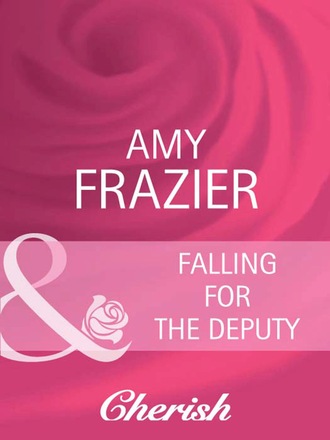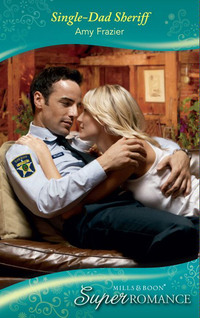
Полная версия
Falling For The Deputy
“The point being?” It was her turn to bridle. She’d never liked lectures. And she didn’t like overbearing men.
“The point…” He tapped her notepad with his index finger. “If the electorate has the sense they were born with, they better damn well want to know how we’re carrying out our duties.” As his voice rose, he accidentally knocked a stack of file folders off a tall cabinet onto the floor. He ignored the mess.
Heavens. If this was the deputy in charge, what was the sheriff like? Chloe refused to be daunted. If the truth be told, his civic ardor excited her. Electrified the room. What good was a career if you weren’t passionate about it?
She crossed her legs, sat up straight and met the deputy’s fierce expression. His eyes weren’t merely dark brown, they were hickory-nut-brown, she noticed. And hard. “Then we’d better back up. The sheriff said y’all had turned the office around. What was the problem?”
He remained immobile for several moments, staring at her. The information had to be public record. Narrowing his eyes, he appeared to come to a decision.
“Five years ago,” he began with great deliberation, “Zach Taylor sold four hundred acres of prime land to a real-estate developer who, in turn, built two complexes—year-round executive homes and expensive vacation homes. Those complexes attracted hundreds of families to Applegate. The population of Colum County soared.”
“Bringing new problems to your department.”
“It wasn’t our—Sheriff McQuire’s—department at the time.”
“But there were problems.”
“Yes. But I think Sheriff McQuire intended that you concentrate on the present, not the past.”
That wasn’t how the media worked, but she knew to choose her battles. “How have things changed?” She tuned into his body language as she waited.
He began to pace the cramped quarters, stepping over the spilled folders. “For one thing, we now run things strictly by the book.”
Chloe took down his words without comment. There would be time enough to determine if the new sheriff ran an honest department. Believe only what you see, what you can prove, her mother, a scientist, always said.
She raised her head. “And for another?”
“For another, we’ve brought the department into the computer age.”
Suppressing an urge to yawn, she bet her next paycheck her readers couldn’t care less about the sheriff’s computers. But the personnel might be a different issue. Take this particular deputy, for instance. Confrontational. Ardent. Protective. But what, exactly, was he protecting? She’d find out soon enough.
“What about the sheriff’s staff?” she asked.
“What about us?”
“What makes you different from the last batch?”
He flinched. “We’re handpicked—”
“Not elected like the sheriff?”
“No, but—”
“Mack!” Another deputy stuck her head through the office doorway. “You’re wanted at the high school. Stat.”
As Deputy Whittaker reached for his Stetson, Chloe stuffed her pencil, notebook and camera in her backpack, then activated her pocket tape recorder. When the two deputies left, Chloe trotted along right behind, observing every move, picking up every word.
“What’s the story?” Whittaker asked.
“Rival groups again,” the second deputy answered. Her name tag read Breckinridge. “Same old beef. This time someone pulled a knife.”
“Do we have anyone out there?”
“McMillan and Sooner answered the call. The kids are being held in the school cafeteria until you and the parents get there. Most of them are from The Program. That’s why Principal Cox called for you.”
Chloe didn’t understand everything they were saying. She hoped the recorder was picking it up, allowing her to get clarification later. This was the kind of eye-witness involvement she’d anticipated, the kind that would lead to a compelling story. Her pulse raced.
Deputy Breckinridge halted at the big double doors leading to the parking lot, but Chloe slipped outside behind Whittaker. He didn’t acknowledge her presence.
When he got to his cruiser, she automatically went to the passenger door.
“What the hell do you think you’re doing?” he barked across the roof.
“I’m working my story.”
“Today’s interview is finished.” Abruptly he got into the driver’s side and slammed the door. She opened the passenger door and climbed in, slamming her door for good measure.
“Get out.” By his tone of voice, he meant business.
So did she. “Drive.”
He glared at her.
“While you’re driving,” she added, “you can explain the history of this altercation.”
Muttering under his breath, he turned the key in the ignition. As he pulled the patrol car out of the parking lot, she could feel the anger radiating off him.
“I’m not going to waste time arguing with you.” The veins corded and pulsed along his temple. “When we get back, though, I’m calling the Sun to request your replacement.”
He wouldn’t dare. But in case he did, she hunkered down in her seat and prepared to defend her right to be there.
CHAPTER TWO
IT WAS ALL MACK COULD DO not to speed. At least Deputies Sooner and McMillan had this call under control. The kid—the reporter—wouldn’t be in any danger. Only in the way.
When he heard a click, he looked over at her. She had taken his picture. An itchy heat crawled up the back of his neck to join forces with the headache. “Put that thing away,” he warned, holding up his hand to shield himself.
“You’d better get used to it. Do you know how many photos I’ll have to take to get two or three perfect ones for the article?”
He grasped the steering wheel tightly and concentrated on the double yellow line in front of him. On the evergreens and granite boulders crowding the edges of the two-lane county road. On anything but her. She was an invasion.
“Put it away for this call,” he ground out. “Even under the best of circumstances, you’d have to get written releases to photograph the students. And these aren’t the best of circumstances.”
“But I’m photographing you—”
“Put it away.”
She sighed.
He refused to look at her again.
After several seconds he could hear her zip the camera into her backpack. “Why were you called to the school,” she asked, her words measured, “if your deputies already had the situation in hand?”
He took a deep breath. “This program’s the sheriff’s baby. Right now, I’m acting sheriff.”
“What program?”
He might as well tell her the whole story. She wasn’t going to let up until she got it. “Because of county-wide growth,” he began, “we had to build a third high school. Letting the seniors spend their last year at their two old schools—McEaster and North Colum—the board of ed pulled surplus juniors and underclassmen from the overcrowded schools to attend the new one—Harriman.”
“And if this area is anything like all the others in the South,” Chloe said, “high-school sports rule. They fuel small-town social life and loyalties.” She was quick to catch on.
“Yeah.” He ran his window down. Quick to catch on or not, she made the car’s interior feel too close for comfort. “The underclassmen have settled in fine, but the juniors have the hardest time forgetting. McEaster and North Colum used to be fierce rivals. Now the students from those two schools are expected to pull together for a brand-new school.”
“Deputy Breckinridge said someone pulled a knife this time. That’s extreme.” She had good ears, too.
“You have to understand. Not only are we dealing with the displacement of old school loyalties, but also with an influx of newcomers, mostly affluent families from the city. Plus immigrant workers who’ve come to service an expanding vacation sector. There’s cultural friction…and more. We may be rural, but we aren’t untouched by drugs. Meth has replaced moonshine.”
“And you can never minimize the pressure of teenage hormones.”
Caught off guard by the thoughtfulness in her tone of voice, he hazarded a sideways look at her. “You’ve got it.” Her eyes half closed, she was contemplating him. He snapped his head forward. “So…Sheriff McQuire established a program,” he said, retreating to his spiel. “A public-safety program that’s an offshoot of the Junior Deputy Program we run in the elementary schools. The sheriff put me in charge of the high school.”
“I can’t picture teenagers willingly participating in something called a Junior Deputy Program.”
The cruiser’s two-way radio crackled. As she reached out to adjust the volume, he put out his hand to stop her. Apparently, she wasn’t real good with boundaries.
“At the high-school level,” he explained, “we just call it The Program. And it’s as no-nonsense as its name. We deal with peer pressure, drugs, conflict resolution. All under the umbrella of public safety. We pull no punches in how we talk to the kids.”
Straining against her seat belt, she leaned forward to examine the controls on the dashboard. “Why did Sheriff McQuire put you in charge of it?”
Probably because Mack knew these kids inside out. He’d been one of them. Full of piss and vinegar, his grandmother used to say. But he wasn’t about to tell this to a stranger, a reporter, no less. “You’d have to ask the sheriff.”
He could feel her eyes on him, but he kept his own on the road. “Back to the kids,” she said, her tone level. Patient, even. When you didn’t look at her, she came off as mature. “Even with a realistic course for them, they still get in trouble?”
“They’re kids. Obviously you don’t have any.” Out of the corner of his eye, he thought he saw her stiffen.
“N-no.” Her hesitation seemed out of character. “I’ve never been married. Are you married?” She lobbed that question as she might something dangerous she wanted to get rid of. “For the record.”
“Married to the job. But this article’s not about me, remember.”
Did he hear an oh, yeah? in the silence?
“So what’s the game plan when we reach the high school?” she finally asked.
“By the time we get there, the principal should have assembled the parents—even the working parents. Getting them involved in school altercations should cut down on more serious…incidents in the future. I’m essentially going to run a conflict-resolution session with these kids, their parents and the school counselors.”
“And me?”
With relief he saw the cell-phone tower above the trees of the high-school campus. The school itself couldn’t appear fast enough for him. He needed to get back to his duties. Clear-cut action to solve a specific problem. And away from all this hopscotch questioning.
“And you? You’re going to sit in the corner,” he replied, suspecting he might later regret this decision. “Out of the way. Where you’ll observe and take notes.”
“Why should I take notes? I thought when we got back to your office, you were going to call the Sun and get them to replace me.”
As if it required all his attention, he hit the directional signal as they neared the school entrance. Made himself listen to it click three times before answering her. “Let’s say you’re quick,” he admitted. “You catch on to what’s happening without me hammering it home. If you stay out of my way and let me do my job, maybe we can work something out.”
“Maybe? Am I, like, on parole?”
Was she trying to tick him off? He pulled into the parking lot and stopped in front of the main entrance. With an irritated shove, he opened his door and got out.
CHLOE OBSERVED THE STUDENTS, their parents and school officials as they dispersed from the cafeteria. She’d been witness to Deputy Whittaker’s impressive display of self-control balanced by his uncanny understanding of human nature.
Surprise, surprise. The man had a non-prickly side to him.
It was good he’d been the focus of her story because, once inside the school, surrounded by teenagers, she’d remembered why she’d told her editor she’d never do the board of education beat. Claire would have been seventeen…
Fortunately the deputy interrupted her reverie as he walked across the big room to where she sat on a folding chair next to the emergency exit. He should be pleased he’d brought the intervention to such a positive end, yet he didn’t look it. His shoulders were stiff, his mouth was set in a severe line, and he carried himself with military bearing.
Automatically Chloe rose and retreated a step toward the emergency door. Why was it that in his presence she felt compelled to stand and salute?
“Ready to go?” His staccato words jolted her. Her backside hit the door’s push bar and the door opened. The alarm sounded. The other deputies, the principal, the school counselors, several remaining parents and their kids froze. The kids began to snicker.
Whittaker reached past her with a grimace that said she’d lost any Brownie points she’d scored during the meeting by staying out of the way. Wordlessly he disengaged the alarm, then closed the door.
“Reporter humor?” he asked.
When she chose to consider that a rhetorical question and remained silent, he grasped her by the elbow and propelled her out of the cafeteria.
“Tomorrow I think I’ll hand you over to Deputy Breckinridge,” he said as he marched her through the school corridors to the front door. “She’s on desk duty.”
Feeling like a truant on the way to the principal’s office, Chloe tried not to pant keeping up with his long-legged stride. “I don’t think desk duty was what Sheriff McQuire had in mind when he called in the press,” she declared, wresting control of her elbow from Whittaker. “Besides, you and I haven’t finished with today.”
In the parking lot he swiveled to face her. “I’m in charge while the sheriff’s away. Today’s interview is finished. I’ll drive you back to the B and B.”
Her mouth dropped open. “Now wait a minute. This isn’t going to work as a piecemeal deal. I’m supposed to walk in your shoes. Get a feel for your job. A couple hours a day won’t cut it. You haven’t even offered me a doughnut.”
Instantly she regretted her unprofessional dig.
He slid behind the wheel. Because she didn’t doubt he’d leave her in the parking lot, she scrambled into the passenger seat.
The cruiser’s radio crackled. Chloe didn’t understand the entire message, delivered in clipped jargon, but she caught the words cat, tree and Sarah Culpepper. When she turned to the deputy for explanation, he concentrated on his driving as if it were his first time behind the wheel. To Chloe’s surprise, the tips of his ears were a deep shade of pink.
He cut her a glance. “I have a stop to make before I drop you off. You can stay in the car.”
“Is it a dangerous situation?”
“No.”
“What is it, then?”
He remained silent.
Chloe suspected he had an amazing capacity to stonewall. Well, she had an amazing capacity to persist. “You don’t get to pick and choose what I see this week, Deputy. I’m here to record the good, the bad and the ugly.” She reached in her backpack for her Nikon.
“Put that thing away and I’ll explain.”
She did as he ordered, telling herself he hadn’t specified for how long.
“It all began,” he said, clearly exasperated, “when Bonita Culpepper bought her granny a cell phone after a talk given at the seniors’ center. On personal safety.”
“Cell phones for the elderly. That sounds like a good suggestion.” She heard a click in her pocket. “Wait! Wait!” Quickly she removed the finished tape from the tiny recorder, then rummaged in her other pocket for a spare.
“Sarah Culpepper makes good use of her phone,” he continued, ignoring her. He certainly didn’t follow instructions very well. “No matter what her trouble is, she thinks she has a direct line to me.”
“Who can you turn to if you can’t turn to the sheriff?” she asked as she found a spare tape and jammed it in the recorder.
“Miss Sarah and I go back a long way. To when I was a boy. I’m not sure she sees me as a cop. As an adult, even. To her, I’m the neighbor’s kid Mack, and I’m the one who always shinnied up her tree to rescue her cats.”
“She had a cell phone when you were a boy?”
“No. She lives on a slip of property that abuts my family’s homestead. She used to blow an old conch shell when she needed something.”
“It’s amazing that sound didn’t scare the cats right out of the tree.” Things were looking up. Chloe sat back in her seat and waited for events to unfold. She was about to see where Whittaker grew up and meet a woman who knew him as a boy. Now this might be a human-interest story in the making.
Mack sensed the smug satisfaction oozing from Chloe’s side of the car, but there wasn’t much he could do about it. Miss Sarah’s house was coming up. He couldn’t waste time or gas ferrying the reporter to town and driving back out here. For a cat. He pulled into the swept dirt front yard of the shotgun house. It sat in a grove of trees alongside the road to the Whittaker property.
He could hope the kid stayed in the cruiser. He could hope that, today, Miss Sarah’s cat was easy to reach, giving the elderly woman less time to fill the reporter’s head with tales of his youth. Hey, he could always hope he won the lottery while he was at it.
He pulled on the emergency brake. “This won’t take long.” His passenger had already cracked open her door. “You don’t have to get out.”
“All part of the story.”
That was what he’d been afraid of.
“I hear meowing,” she said.
“It’ll be coming from the sweet-gum tree right over there. It usually is.” He walked in the direction of the sound without checking to see if his shadow followed.
She did. “Is this the same cat you rescued as a boy?”
“Hardly.” There’d been a succession of cats. All squirrel hunters. All with an uncanny inability to get down from a tree once they’d chased their prey up it. “All with the same name, though. Buster.”
“Same tree?”
“Mostly.” Mack looked toward the leafy canopy to discover not only Miss Sarah’s cat stranded in the sweet gum, but Miss Sarah herself.
Her apron in a bunch around her middle, she clutched the tree trunk with one hand and her cell phone with the other. “You sure took your sweet time, Mack Whittaker.”
He spotted the overturned kitchen chair at the base of the tree. “Now, why didn’t you wait for me, Miss Sarah? Don’t I always come?”
“Sooner or later.” She hugged the tree trunk more tightly. “These days it’s more often later than sooner.”
“Deputy Whittaker had an emergency meeting at the high school,” the kid piped up.
Miss Sarah squinted down from her precarious seat. “Who are you?”
“I’m Chloe Atherton, ma’am. From the Western Carolina Sun. I’m doing a story on the Colum County Sheriff’s Department.”
“Will I be in it?”
“Well, it sure looks as if you’re part of the job.” And right then and there, Kid Atherton had the nerve to take a picture of the old woman up a tree.
He grabbed the Nikon.
“Hey! Give that back!”
“Have a sense of decency,” he muttered through clenched teeth.
“Give her back the camera, Mack,” Miss Sarah ordered. “It’s not often an old woman gets herself some attention.”
When he handed it over, the reporter examined it carefully. “Ms. Culpepper,” she said, with a none-too-happy glance in his direction, “this is a digital camera, so you can preview the photos. I’ll erase any you’re not happy with.”
“Suits me fine,” Miss Sarah retorted. Now she sent Mack a disapproving look.
He couldn’t win.
“Ladies, if you’ll excuse me.” When he stepped under the low branch Miss Sarah sat on, his head reached her knees. “You can chat when both of you are on the ground.” He held up his arms. “Push off, and I’ll catch you.”
Miss Sarah ignored him and concentrated, instead, on Chloe. “I’d like you to take a picture of Buster.”
As if seconding that suggestion, a plaintive meow wafted from the upper branches.
Mack had endured enough of the niceties. “Ma’am, with all due respect, if you don’t hop down—now—I’m going to leave and let the next big wind blow you and Buster out of this tree.”
“You won’t and you know it.” Despite her assumption, she slid off the branch, anyway, and into his outstretched arms in a puff of nutmeg-scented flour. Flour and all, she must have weighed no more than ninety-five pounds.
“I declare,” she said, dusting off her clothing with one hand and shaking her cell phone next to her ear with the other. “While you get Buster, Mack, let me see about hermit bars and sweet tea. Made ’em myself, you know.”
“Thank you, but we won’t be staying,” he countered.
“Yes, you will.” Miss Sarah beckoned to Chloe. “Girl, you can help me.”
Reluctant to leave the two alone, he nonetheless swung himself up onto the lowest branch.
Once his footing was secure, he surveyed the surrounding landscape from his new perspective. Nothing adjusted your attitude faster than climbing a tree. Maybe that was why he didn’t foist these cat-rescue missions off on one of the other deputies. For a few minutes every so often he got to feel like an innocent kid again in the branches of the Culpepper sweet gum.
He located Buster, hunkered down and suspicious, but within reach. Remembering the scratches this particular demon feline had inflicted last time, he cautiously wrapped his hands around the cat’s middle. The Busters were the drawback to the tree-climbing respite.
HAVING TAKEN ONLY ONE mouthwatering bite of a homemade hermit, Chloe set the still-warm bar on a paper napkin to photograph Whittaker slowly maneuvering the branches with an indignant tabby in his arms. He’d left his hat in the car, and his dark, wind-ruffled hair no longer looked regulation. Although the climb in the tree had taken some of the starch and press out of his uniform, he still looked like a man used to commanding authority.
Sarah Culpepper stood beside Chloe on the narrow back porch and wiped her hands on her apron. “Despite the scrapes he’s been in, that boy was destined to be a lawman.”
“Scrapes? What—”
“Weren’t you listening?” Sarah snapped. “I said Mack was destined to become a lawman.”
For a fleeting instant Chloe thought the deputy might have engineered this particular PR stop. “Always?” If dirt were to be dug, she had a week to do it.
“Well, I’m not saying he always acted out what he knew to be right,” Sarah said as she lined up three tall glasses on the porch railing, then filled them with tea. “And as a boy, he did have a devilish sense of humor that sometimes compromised his better nature.”
Humor? He’d been pretty taciturn to this point. Chloe looked in the deputy’s direction. In one fluid motion, he lowered himself to the ground, then deposited Buster at his feet. Cricking his tale, the cat stalked haughtily a few paces away, then sat and began to wash himself. Chloe continued taking photos as Whittaker brought the kitchen chair back to the stoop.
“Thanks for entertaining Ms. Atherton,” he said. To Chloe he added, “Time to go.”
Chloe slipped a couple hermit bars in her pocket in case he meant it.
“Sit down.” Sarah thrust a glass of sweet tea at the deputy. “And you,” she ordered Chloe, “need to go get that picture of Buster. Make sure his eyes are open. He has beautiful gold eyes.”
Chloe was quick to comply. When she’d taken several photos of the cat, she hurried back to show Sarah, only to find her deep in conversation with Whittaker, who was actually chuckling.
Seeing Chloe, he stopped short, then drained his glass. When he turned toward the cruiser, Sarah reached out to hold him back. “I was about to tell Chloe about your devilish sense of humor,” she said.
“Don’t believe a word of it.” Mack ran his fingers through his close-cropped hair, resignation settling over his features.
“Well, Myron Hapes had a workshop behind his house,” Sarah began. “A shed, really. Used to relax after a day of delivering the mail by doing woodwork in the evenings. Now when nature called, he’d avail himself of an old outhouse on the back of his property. If Estelle Hapes knew I was telling you this, she’d have a cow, especially seeing how proud she is of that new twenty-thousand-dollar bathroom she had put in off the master bedroom.”









